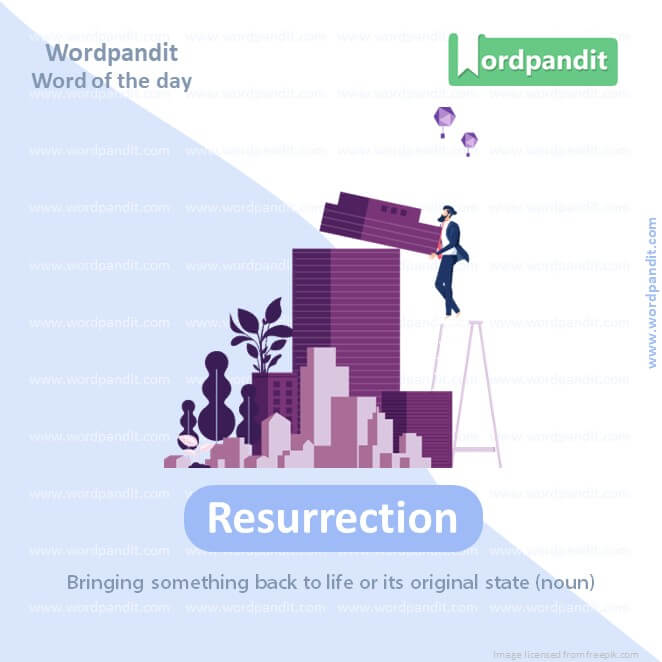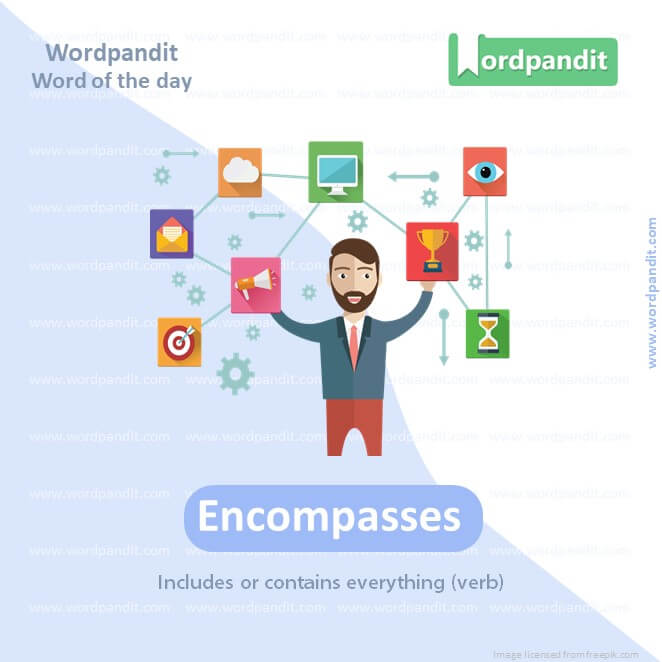Daily Vocabulary Words: List of Daily Used Words
Hi there. Welcome to this special section @ Wordpandit.
Our endeavour here is straightforward: highlighting important daily vocabulary words, you would encounter in The Hindu. This is your repository of commonly used words; essentially, we are posting a list of daily used words. Hence, this has significant practical application as it teaches you words that are commonly used in a leading publication such as The Hindu.
Visit the website daily to learn words from The Hindu.

WORD-1: Resurrection
CONTEXT: It is a gamble from the point of view of a resurrection of secularism in India.
SOURCE: The Hindu
EXPLANATORY PARAGRAPH: Imagine you have a toy that breaks and stops working. But one day, it’s fixed and starts working again as if it never broke. “Resurrection” is like that. It means something is brought back to life or made new again.
MEANING: Bringing something back to life or its original state (noun).
PRONUNCIATION: Rez-ur-REK-shun
SYNONYMS: Revival, renewal, rebirth, renaissance, restoration, regeneration, comeback.
USAGE EXAMPLES:
1. The resurrection of the old playground made many children happy.
2. Easter celebrates the resurrection of Jesus Christ.
3. The town saw the resurrection of its old traditions.
4. After the fire, there was a resurrection of the forest.

WORD-2: Reinvigorated
CONTEXT: The environmental devastation caused in the Himalayan States of Himachal Pradesh, Uttarakhand and Sikkim has reinvigorated the debate on the “carrying capacity’ of the regions.
SOURCE: The Hindu
EXPLANATORY PARAGRAPH: Think about feeling very tired after playing, but then you drink some water, rest a bit, and feel all energetic and ready to play again. “Reinvigorated” is a word that means feeling refreshed and full of energy again.
MEANING: Made to feel fresh or strong again (adjective).
PRONUNCIATION: Re-in-VIG-or-ay-ted
SYNONYMS: Refreshed, renewed, revitalized, rejuvenated, restored, recharged, reenergized.
USAGE EXAMPLES:
1. After a good night’s sleep, she felt reinvigorated.
2. The team was reinvigorated by their coach’s pep talk.
3. The rain reinvigorated the dried plants.
4. The vacation left me reinvigorated and ready to work.

WORD-3: Flawed
CONTEXT: The recommendations made by the Ministry in forming such groups are flawed.
SOURCE: The Hindu
EXPLANATORY PARAGRAPH: Imagine you have a drawing, but there’s a small mistake on it. That little mistake can be called a “flaw”. So, when something is “flawed”, it means it’s not perfect and has some mistakes.
MEANING: Having imperfections or mistakes (adjective).
PRONUNCIATION: Flawd
SYNONYMS: Imperfect, blemished, faulty, defective, marred, damaged, broken.
USAGE EXAMPLES:
1. The diamond was flawed and had a small crack.
2. Even though the plan was good, it was slightly flawed.
3. Every person is flawed in their own unique way.
4. The painting was beautiful, but I noticed a flawed section.

WORD-4: Encompasses
CONTEXT: The focus has to be on sustainable development that encompasses the larger canvas of carrying capacity, and the process should be people-centric.
SOURCE: The Hindu
EXPLANATORY PARAGRAPH: Imagine you give a big hug to all your toys at once. You are covering or surrounding all of them. “Encompasses” is like that big hug, meaning it covers or includes everything.
MEANING: Includes or contains everything (verb).
PRONUNCIATION: En-KUM-puh-siz
SYNONYMS: Contains, includes, covers, encircles, surrounds, embraces, entails.
USAGE EXAMPLES:
1. The book encompasses all the important events of that year.
2. The museum encompasses artifacts from various civilizations.
3. Her job encompasses a range of responsibilities.
4. The tour encompasses all major tourist spots.

WORD-5: Formidable
CONTEXT: Israel’s formidable array of electronic sensors and surveillance systems along the border did not work.
SOURCE: The Hindu
EXPLANATORY PARAGRAPH: Think of a big, strong superhero or a giant dragon. They’re so strong that they might be hard to defeat. “Formidable” is a word we use to describe something very strong or powerful that can be challenging.
MEANING: Very strong, powerful, or challenging (adjective).
PRONUNCIATION: For-MID-uh-bul
SYNONYMS: Powerful, strong, challenging, daunting, impressive, intimidating, mighty.
USAGE EXAMPLES:
1. The mountain was a formidable challenge for the climbers.
2. The army had a formidable reputation.
3. She faced formidable opponents in the competition.
4. The storm presented a formidable threat to the village.
WORD-6: Presumably
CONTEXT: This failure is being attributed to the high order of communications security practiced by Hamas, which presumably avoided the use of phones and other forms of digital communication that are susceptible to interception.
SOURCE: The Hindu
EXPLANATORY PARAGRAPH: Imagine you see clouds in the sky and think, “It might rain soon”. You’re making a good guess based on what you see. “Presumably” is a word we use when we make a good guess about something.
MEANING: Based on a good guess or what seems likely (adverb).
PRONUNCIATION: Pre-SOOM-uh-bly
SYNONYMS: Probably, likely, possibly, assumably, seemingly, supposedly, I presume.
USAGE EXAMPLES:
1. Presumably, they will arrive by the evening.
2. The cake is missing; presumably, someone ate it.
3. She is, presumably, the best candidate for the job.
4. It’s raining, so presumably, the match will be canceled.
WORD-7: Normalcy
CONTEXT: Hamas seems to have succeeded in lulling Israel into a false sense of normalcy.
SOURCE: The Hindu
EXPLANATORY PARAGRAPH: Think of your everyday routine, like waking up, brushing your teeth, and going to school. That’s what you usually do, right? “Normalcy” means things being usual or regular.
MEANING: The condition of being usual or regular (noun).
PRONUNCIATION: NOR-mul-see
SYNONYMS: Normality, regularity, routine, usualness, ordinariness, typicality, standardness.
USAGE EXAMPLES:
1. After the holidays, life returned to normalcy.
2. People craved normalcy during the chaotic times.
3. The city found its normalcy a few weeks after the event.
4. She appreciated the normalcy of her daily life.
WORD-8: Eradication
CONTEXT: The persistence of the ideology of the Islamic State despite the physical eradication of its so-called Caliphate offers any lessons in this regard.
SOURCE: The Hindu
EXPLANATORY PARAGRAPH: Imagine you have some crayon marks on the wall and you clean them so well that they’re all gone and can’t be seen anymore. “Eradication” means completely getting rid of something, just like those crayon marks.
MEANING: The act of completely getting rid of something (noun).
PRONUNCIATION: Ee-rad-i-KAY-shun
SYNONYMS: Elimination, removal, extermination, obliteration, destruction, wiping out, annihilation.
USAGE EXAMPLES:
1. The eradication of diseases is a global goal.
2. Pesticides are used for the eradication of pests.
3. The program aims at the eradication of illiteracy.
4. Eradication of invasive plants took a lot of effort.
WORD-9: Anomaly
CONTEXT: Many people in the industry say the early morning shows, screened in about 50 single-screen theatres in Tamil Nadu, were a way of resolving this market anomaly.
SOURCE: The Hindu
EXPLANATORY PARAGRAPH: Imagine you see a penguin in the desert! That’s strange, right? Because penguins live in cold places, not in deserts. That penguin is an “anomaly”, which means something unusual or different from what is expected.
MEANING: Something unusual or different from what is expected (noun).
PRONUNCIATION: Uh-NOM-uh-lee
SYNONYMS: Irregularity, exception, oddity, aberration, rarity, peculiarity, outlier.
USAGE EXAMPLES:
1. The scientist noticed an anomaly in the data.
2. The pink dolphin is an anomaly in the blue ocean.
3. That old tradition is an anomaly in modern times.
4. Finding snow in the tropics would be an anomaly.
WORD-10: Exorbitant
CONTEXT: Successive State governments have looked the other way regarding early morning shows. But reports of theatres selling tickets at exorbitant prices.
SOURCE: The Hindu
EXPLANATORY PARAGRAPH: Think of a toy that you really want, but it costs so much money that it seems too much. “Exorbitant” is a word we use to say that something costs more than it should or is very expensive.
MEANING: Much more than is reasonable or expected (adjective).
PRONUNCIATION: Ex-OR-bi-tant
SYNONYMS: Expensive, steep, overpriced, inflated, outrageous, unreasonable, lavish.
USAGE EXAMPLES:
1. The hotel charged an exorbitant price for a single night.
2. People protested against the exorbitant tax rates.
3. Buying a diamond ring can be an exorbitant expense.
4. The concert tickets had exorbitant prices.
vocabulary new words with meaning and sentence
In the quest for effective communication and textual comprehension, gaining proficiency in ‘vocabulary new words with meaning and sentence’ is a vital step. This refers to the method of learning new words, understanding their meanings and context, and applying them in sentences. In expanding your lexicon, you become better equipped to express complex emotions and thoughts, to comprehend complicated narratives, and to engage in intellectual discourse.
The first aspect of learning ‘vocabulary new words with meaning and sentence’ involves seeking out and identifying new words. This can be done through reading widely, ranging from newspapers and novels to scientific journals and poetry. Listening to lectures and engaging in intellectual discussions can also be instrumental here. The goal is to expose oneself to a diverse range of vocabulary and dialects.
The second aspect to learning ‘vocabulary new words with meaning and sentence’ is understanding their meanings. This involves using dictionaries, digital tools, and context clues to gain a clear understanding of what each word signifies. In this phase, it’s essential to understand the layers of meanings a word might possess according to different contexts they are used in.
The final aspect of mastering ‘vocabulary new words with meaning and sentence’ is to apply them in sentences. By constructing sentences with new words, learners can understand their practical application. This not only solidifies their understanding but also helps to ingrain those words into their cognitive vocabulary-deck.
In conclusion, expanding ‘vocabulary new words with meaning and sentence’ can be a transformative approach to personal growth, knowledge enrichment, and effective communication. Therefore, approach this learning with curiosity and dedication, and you’ll be able to unlock new doors to understanding the world and expressing your thoughts.











